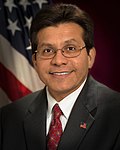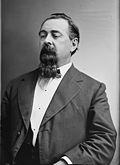Hispanic and Latino conservatism in the United States
However, following the Great Depression, more Hispanics began to side with the Democratic party, due to Franklin D. Roosevelt and his New Deal agenda.
Many Hispanics were distrustful of Herbert Hoover and the Republican party, who they viewed as responsible for the economic crash.
[6] American Hispanics first began to widely support a Republican candidate, Dwight D. Eisenhower, during the 1952 U.S. presidential election.
Other non-veteran Hispanic voters were drawn to Eisenhower, due to his promotion of hard work, freedom, prosperity, and religious spirituality.
Hispanic conservatives created groups such as "Latinos con Eisenhower" and pinned political buttons on their shirts stating "Me Gusta Ike".
[14] In 2004, according to research by the Thomás Rivera Policy Institute, 58% of Hispanic and Latin voters self-identified as a Democrat, while 22% identified as a Republican and 19% as an Independent.
The study also compared the 8.9% Latin share of voters to veterans (12% of the electorate), those with family incomes above $100,000 (18%), seniors 65 and older (19%), married persons (60%), and those who live in owner-occupied housing (80%).
[19] In terms of voter turnout, the Center for Studies projected that 52.7% (±0.6) of eligible Latins would vote in the 2012 election, an increase from 49.9% in 2008 and a continuation of the past decade's long upward trend.
[22] According to a 2019 Gallup Poll, 29% of Hispanics and Latins identify as conservative, and that same number, 29%, voted for Donald Trump in the 2016 Presidential Election.
[38] In 2020, the economy, health care, and the COVID-19 pandemic were reported to be the top three most important issues for Hispanic voters.
[42] The term has been used by prominent Democratic politicians such as Joe Biden, Elizabeth Warren, and Alexandria Ocasio-Cortez; who have been widely mocked by many Republicans, Hispanics, and Latins for its use.
[49] This is a timeline of significant events in Spanish, Hispanic and Latin history which have shaped the conservative movement in the United States.











